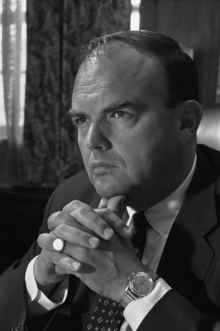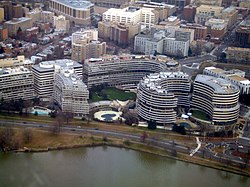John Ehrlichman
John Ehrlichman | |
|---|---|
 Ehrlichman as Assistant to the President for Domestic Affairs, May 13, 1969 | |
| 12th White House Counsel | |
| In office 1969–1970 | |
| President | Richard Nixon |
| Preceded by | Larry Eugene Temple |
| Succeeded by | John Dean |
| Personal details | |
| Born | John Daniel Ehrlichman March 20, 1925 Tacoma, Washington, United States |
| Died | February 14, 1999 (aged 73) Atlanta, Georgia, United States |
| Political party | Republican |
| Spouse | Karen Hilliard (3rd marriage) |
| Alma mater | University of California, Los Angeles (BA) Stanford Law School (J.D.) |
| Profession | Lawyer |
| Watergate scandal |
|---|
 |
| Events |
| People |
John Daniel Ehrlichman (March 20, 1925 – February 14, 1999) was counsel and Assistant to the President for Domestic Affairs under President Richard Nixon. He was a key figure in events leading to the Watergate first break-in and the ensuing Watergate scandal, for which he was convicted of conspiracy, obstruction of justice and perjury. He served a year and a half in prison for his crimes.
Early life
Ehrlichman was born in Tacoma, Washington, the son of Lillian Catherine (née Danielson) and Rudolph Irwin Ehrlichman.[1][2][3][4] His family practiced Christian Science (his father was a convert from Judaism).[5] He was an Eagle Scout and recipient of the Distinguished Eagle Scout Award.[6] In World War II, Ehrlichman won the Distinguished Flying Cross as a lead B-17 navigator in the Eighth Air Force.[6] (In the same war, his father served in the Royal Canadian Air Force, and was killed in a crash in Torbay, Newfoundland (later Canada), on May 6, 1942.[7][8]) Taking advantage of the G.I. Bill after the war, Ehrlichman attended the University of California, Los Angeles, graduating in 1948 with a BA in political science. After graduating from Stanford Law School in 1951, he joined a Seattle law firm, becoming a partner, practising as a land use lawyer, noted for his expertise on urban land use and zoning. He was active in the Municipal League, supporting its efforts to clean up Lake Washington and improve the civic infrastructure of Seattle and King County. He remained a practicing lawyer until 1969, when he entered politics full-time.[9]
Political life

Ehrlichman worked on Nixon's unsuccessful 1960 presidential campaign, and his unsuccessful 1962 California gubernatorial campaign. He was an advance man for Nixon's 1968 presidential campaign.
Following Nixon's victory, Ehrlichman became the White House Counsel (later replaced by John Dean). He held this post for about a year before he became the Chief Domestic Advisor for Nixon. It was then that he became a member of the inner circle of Nixon's closest advisors. He and a close friend, H. R. Haldeman, whom he met at UCLA, were referred to jointly as "The Berlin Wall" by White House staffers because of their German-sounding family names and their penchant for isolating Nixon from other advisors and anyone seeking an audience with him. Ehrlichman created "The Plumbers", the group at the center of the Watergate scandal, and appointed his assistant Egil Krogh to oversee its covert operations, focusing on stopping leaks of confidential information after the release of The Pentagon Papers in 1971.
Henry Paulson was John Ehrlichman's assistant in 1972 and 1973.[10]
After the start of the Watergate investigations in 1972, Ehrlichman lobbied for an intentional delay in the embattled confirmation of L. Patrick Gray as Director of the F.B.I. He argued that the confirmation hearings were deflecting media attention from Watergate and that it would be better for Gray to be left "twisting, slowly, slowly in the wind." The quote served as the embodiment of one of Ehrlichman's main functions during his years in the White House, to seek and destroy Nixon's enemies at virtually any cost, a function that would overshadow his domestic efforts in a White House consumed with foreign policy.
White House Counsel John Dean cited the "Berlin Wall" of Ehrlichman and Haldeman as one of the reasons for his growing sense of alienation in the White House. This alienation led him to believe he was to become the Watergate scapegoat and then eventually to cooperate with Watergate prosecutors. On April 30, 1973, Nixon fired Dean and Ehrlichman and Haldeman resigned.
Ehrlichman was convicted of conspiracy, obstruction of justice, perjury and other charges on January 1, 1975 (along with John N. Mitchell and Haldeman). All three men were initially sentenced to between two and a half and eight years in prison. In 1977, the sentences were commuted to one to four years. Unlike his co-defendants, Ehrlichman voluntarily entered prison before his appeals were exhausted. He was released from the Federal Correctional Institution, Safford,[11] after serving a total of 18 months. Having been convicted of a felony, he was disbarred from the practice of law.
Post-political life
Following his release from prison, Ehrlichman held a number of jobs, first for a quality control firm, then writer, artist and commentator. Ehrlichman wrote several novels, including The Company, which served as the basis for the 1977 television miniseries Washington: Behind Closed Doors.[12] He served as the executive vice-president of an Atlanta hazardous materials firm. In a 1981 interview, Ehrlichman referred to Nixon as "a very pathetic figure in American history." His experiences in the Nixon administration were published in his 1982 book, Witness To Power. The book portrays Nixon in a very negative light, and is considered to be the culmination of his frustration at not being pardoned by Nixon before his own 1974 resignation. Shortly before his death, Ehrlichman teamed with best-selling novelist Tom Clancy to write, produce, and co-host a three-hour Watergate documentary, John Ehrlichman: In the Eye of the Storm. The completed but never-broadcast documentary, along with associated papers and videotape elements (including an interview Ehrlichman did with Bob Woodward as part of the project) are housed at the Richard B. Russell Library for Political Research and Studies, at the University of Georgia in Athens.
Ehrlichman died of complications from diabetes in Atlanta in 1999, after discontinuing dialysis treatments.
In the media
John Ehrlichman was portrayed by J. T. Walsh in the film Nixon.
See also
- Modified limited hangout, a phrase Ehrlichman used in the Watergate tapes
- Operation Sandwedge
References
- ^ LA Times
- ^ Essay on John Ehrlichman, HistoryLink.org
- ^ Ehrlichman, John (1986). The China card: a novel. Simon and Schuster. p. 5. ISBN 0-671-50716-8.
- ^ The 1930 U.S. Census, as indexed on ancestry.com, lists the family as: "John D Ehrlichman", age "5"; "Rudolph I Ehrlichman", age "33"; and "Lillian C Ehrlichman", age "28".
- ^ Rather, Dan; Gary Paul Gates (1974). The Palace Guard. Harper & Row. p. 134. ISBN 006013514X.
- ^ a b Stout, David (February 16, 1999). "John D. Ehrlichman, Nixon Aide Jailed for Watergate, Dies at 73". The New York Times. Retrieved May 6, 2010.
- ^ http://wwii.ca/memorial/world-war-ii/115959/flight-lieutenant-rudolph-irwin-ehrlichman/>
- ^ http://www.iosphere.net/~sullivan/leblanc.htm?vm=r
- ^ "Nation: John Ehrlichman". Time. June 8, 1970. Retrieved May 6, 2010.
- ^ Conversation with Henry Paulson, Charlie Rose Show, October 21, 2008
- ^ Federal Correctional Institute at Safford Az, Federal Bureau of Prisons
- ^ Washington: Behind Closed Doors at IMDb
Further reading
- Ehrlichman John D. Witness to Power: The Nixon Years. New York: Pocket Books, 1982.
External links
- John Ehrlichman's Secret White House Tapes at the Miller Center's Presidential Recordings Program
- John Ehrlichman Believed Henry Kissinger was Deep Throat, an article from Editor & Publisher
- The Testimony of John Ehrlichman & H. R. Haldeman at Smithsonian Folkways
- Descriptive inventory of Eye of the Storm collection held at Richard B. Russell Library for Political Research and Studies
- FBI file on John Ehrlichman
- 1925 births
- 1999 deaths
- American Christian Scientists
- Washington (state) lawyers
- American male writers
- American memoirists
- American military personnel of World War II
- American perjurers
- Deaths from diabetes
- Disbarred lawyers
- Distinguished Eagle Scouts
- Nixon administration personnel
- People convicted of obstruction of justice
- People associated with the Watergate scandal
- Recipients of the Distinguished Flying Cross (United States)
- Stanford Law School alumni
- United States Army officers
- University of California, Los Angeles alumni
- White House Counsels
- Washington (state) Republicans
- Georgia (U.S. state) Republicans
- Writers from Tacoma, Washington

